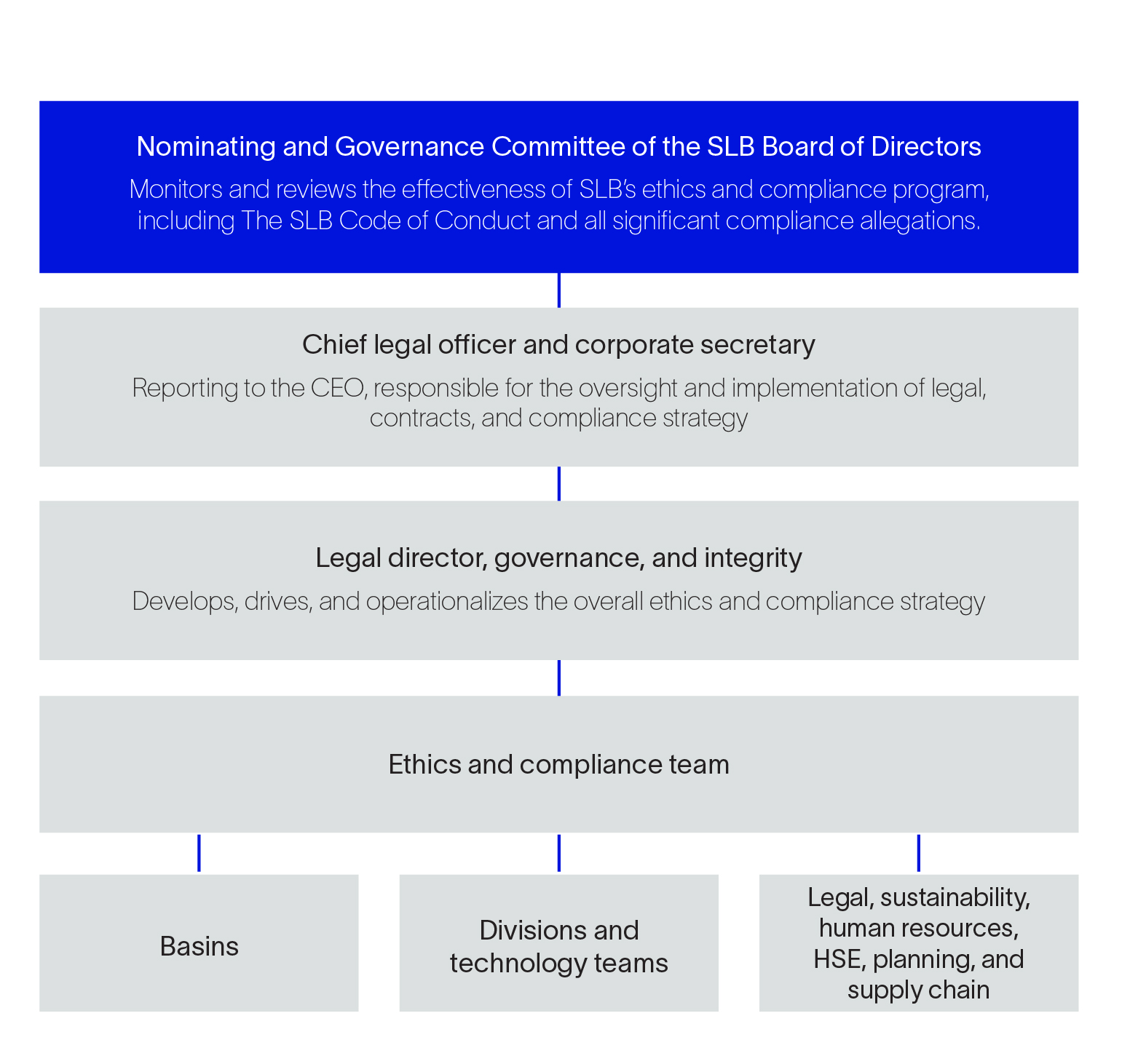Ethics and Compliance
The SLB Board of Directors is the governing body responsible for overseeing our processes for maintaining SLB integrity with regard to our financial statements, internal controls, public disclosures, and compliance with laws and ethics.

The Board of Directors (the Board) approved the company Code of Conduct and policies. Regular review and updates ensure SLB addresses regulatory evolution, emerging risks, as well as customer requirements. Additionally, the Ethics and Compliance (E&C) program ensures compliance risks are known and addressed and that the program is effectively implemented.
The Nominating and Governance Committee of the Board monitors and reviews the effectiveness of and compliance with the E&C program—including significant compliance allegations—and oversees adherence to the Code of Conduct.
Management of SLB leads by example to ensure all employees, suppliers, contractors, and business partners understand that the organization is serious about promoting ethical behavior and performing with integrity.

E&C program
The E&C program includes Tone from the Top, the SLB Code of Conduct, compliance policies and internal requirements, training and communication, E&C risk mapping, third-party management, monitoring and auditing, and allegation reporting and internal investigations.

Risk management
Part of the E&C program requires basins and divisions prepare an Annual Compliance Plan (ACP) to guide their compliance activities. Each year begins with a team review to understand the top compliance risks facing business units. The ACPs are complemented by the Ethics & Compliance Risk Map (ECRM), which is an internal tool for corruption and trade control based on certain predefined data elements. The ECRM enables measuring country-specific risk profiles for countries where SLB operates. Other ACP inputs include reviews or audits performed, allegation reports, the use of agents, third-party indexes, enforcement actions trends, and E&C training delivered in that country during the previous year.
The ACP is subsequently created for each business unit and includes three primary pillars to prevent and mitigate the risks identified—Tone at the Top, Awareness, and Assessment. Within each pillar, tasks are assigned to members of the legal department to complete during the year. The goal of the ACP is to empower each business unit to create bespoke risk management and mitigation plans owned and implemented by management. Progress of the ACP is tracked on a quarterly basis and reported annually to the leadership team.
Antibribery and Anticorruption
SLB maintains zero tolerance for corruption of any kind, and we expect the same from our contractors, suppliers, partners, and agents. We insist they comply with the laws of the countries where they operate and act in a socially responsible and an ethical manner consistent with our Code of Conduct and anticorruption policies and practices. All suppliers, contractors, partners, and agents must be approved and managed in accordance with internal requirements, including through denied-party screening. Agents are processed using a risk-based approach that guides the compliance due diligence process through the Dow Jones’ Risk Center Third Party (RCTP) platform before they can be approved for use. The platform also performs continuous monitoring. Audits are conducted to promote compliance with these requirements.
Allegation Program and Protection
SLB maintains a robust allegation and incident review program, which supports independent review of grievances, as outlined in our Code of Conduct and in our Human Rights Position Statement.
Our allegations program, as outlined in our Allegation Reporting and Management Standard, sets out our detailed grievance response procedures, including assessment, investigation, and remediation requirements, as well as a clear prohibition on retaliation. The E&C Team, in collaboration with subject matter experts, investigates any corruption allegations, and following such investigation, corrective measures, disciplinary actions, or both may be taken to apply established and consistent accountability and discipline, as appropriate.
Allegations procedures include classification of allegations in different categories including human rights. We are committed to providing an effective remedy when our activities may cause or contribute to adverse human rights. SLB encourages third parties to do the same when the impact is linked to our business.
The Allegation Reporting and Management Standard provides guidelines for the identification, reporting, and review of alleged/potential violations of our Code of Conduct. It is an established process enabling consistent oversight of thorough, efficient, and professional ethics- and compliance-related allegation reviews across SLB, as well as a standard mechanism for identifying and recommending corrective measures, if any, to senior management.
The E&C Team is responsible for managing the intake process for ethics- and compliance-related allegations, coordinating and maintaining the SLB EthicsLine, managing the investigation with the appropriate functions, and tracking closures of the allegations.
Employees who believe that a violation of our Code of Conduct, internal requirements, or applicable laws has occurred are required to report their concerns.
A confidential and anonymous report can be made by anyone inside or outside of the organization in 150+ languages. We have a range of reporting mechanisms, including:
- Direct or functional manager
- A manager in HR, legal, finance or another relevant function or the director of compliance
- QUEST event report feature
- 24-hour EthicsLine (third-party provider) via telephone (888-884-8849) or online at www.slbethics.ethicspoint.com
Ethics- and compliance-related allegations are sent to the E&C Team. Upon receipt of an allegation through the reporting options described above, and after classification by the E&C Team, a notice is sent to the relevant management and an independent Incident Review, Team including legal counsels will conduct an appropriate review. Distribution of the allegation is a limited to ensure confidentiality of the investigation. Allegations are closed upon the completion of a systematic review process. This process focuses on: the identification of root causes of nonconformance, creation of action plans and remedial actions to address the root causes and reduce the risk of reoccurrence, and proposal of disciplinary measures. SLB has adopted a Progressive Accountability Guideline as a fair and consistent system for assessing disciplinary actions for individuals who violate the rules.
Importantly, lessons learned are identified from the investigations and are communicated within the company. SLB prohibits and does not tolerate retaliation for good faith reporting of known and suspected violations of our Code of Conduct, our internal requirements, or applicable laws. Reporting options and the prohibition against retaliation are consistently emphasized in E&C training, and managers are regularly trained on the proper manner to receive and handle employee complaints. Any employee who intentionally reports false information will be subject to disciplinary action.
Retaliation for reports made in good faith is not permitted under any circumstance and will be reviewed and addressed consistent with the investigation procedures and if substantiated, Progressive Accountability will be applied. No company employee, director or officer is allowed to retaliate or take any hostile action against anyone who raises an issue of concern in good faith or helps to resolve that kind of issue. Failure to report internally or to provide information, or intentionally reporting false information, may result in disciplinary action.
All SLB employees have an obligation to cooperate with any internal investigation carried out following a report. Failure to cooperate or provide information, or attempting to suppress the cooperation by another, is prohibited and may lead to discipline.
We communicate our reporting system to our employees and third parties globally at various times using different mechanisms such as training, integrity messages and integrity engagements, and we are continuously working to increase awareness of the existing reporting options to reach at-risk populations at SLB facilities.
Training
SLB recognizes that employees with the appropriate E&C knowledge and competencies are best able to carry out their responsibilities in a manner consistent with the Code of Conduct. Employees are the first line of defense in protecting SLB against incidents of noncompliance. E&C training is designed to provide targeted training to employees throughout their careers in SLB, focusing on the E&C risks encountered in their various roles. Members of our workforce, including full-time and part-time employees and contract workers, are required to complete E&C related training on a regular basis and as their career progresses. The E&C training requirements are periodically adjusted to ensure employees continue to receive proper E&C training.
E&C training materials are regularly updated to maintain effectiveness and include relevant lessons from internal investigations or audits. The training materials are also modified to target the risks and needs of a specific audience and highlight behavioral expectations of employees.
Online training is tracked through an online platform known as QUEST. All company employees and relevant contractors are assigned mandatory E&C QUEST certifications, including annual Code of Conduct training, which covers anonymous reporting options, retaliation, ethics, bribery, and corruption and other relevant topics. These certifications are assigned based on job codes and job groups. All QUEST training contains quizzes that trainees must pass to receive credit for completion.
The completion rate of QUEST certifications is taken into account during the annual performance assessment of each employee.
Attendance of in-person trainings and engagements are tracked under the Training and Engagement Platform (TEP). Review of training data helps the E&C Team identify training needs within the organization. All E&C approved training materials reside in the E&C Integrity Portal and are categorized by topic, discipline, and category.
SLB ensures the third parties we do business with have a clear understanding of our compliance expectations. If appropriate, third parties are required to complete a specific E&C training module via live training or as assigned through RCTP.
Code of Conduct
SLB periodically reviews and amends its Code of Conduct to ensure that it addresses any regulatory updates, emerging risks, and client requirements. It was last updated in May of 2023. As part of its continuous improvement culture, SLB benchmarks its E&C program and Code of Conduct through assessments and employee perception surveys.
View the Digital Code of Conduct in your language:
You can also download and print the English version here.
Policies
A range of SLB policies, standards, guidelines, procedures, and business systems supports the Code of Conduct and E&C Program. These policies are intended to offer guidance to employees in their business activities, consistent with our values.
- Anticorruption
- Business Ethics
- Competition Law
- Confidentiality and Information Security
- Conflict of Interest
- Contract Lifecycle Management
- Data Privacy and Protection
- Driving
- Employee Security
- Employment Practices
- Financial Reporting
- Flexible Work
- Immigration Compliance
- Intellectual Property
- Non-Disclosure Agreement
- Personnel
- Procurement & Sourcing
- Quality, Health, Safety, and Environmental
- Risk Management
- Securities Transactions
- Sexual Harassment
- Substance Abuse
- Trade Compliance
Tax Compliance
For details about SLB’s approach to taxation, please click here.
